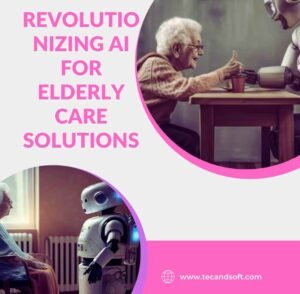In the modern age, AI for Elderly Care is transforming the way older adults receive support and companionship. The growing senior population, coupled with advancements in technology, has paved the way for innovative solutions tailored to enhance the quality of life for the elderly. From assisting caregivers to enabling independent living, AI tools are bridging gaps in care delivery.

AI for Elderly Care: The New Frontier
As populations age worldwide, the demand for effective elderly care solutions is skyrocketing. Traditional caregiving models often face challenges like workforce shortages and inconsistent quality of care. Here, AI for Elderly Care steps in, offering scalable and personalized solutions to meet these challenges head-on.
Key Benefits of AI in Elderly Care
- Personalized Assistance: AI-powered devices like ElliQ, a personal robot assistant for elderly care, provide companionship and assistance. ElliQ helps users with daily reminders, wellness check-ins, and interactive conversations, making it a revolutionary tool in senior care.
- Monitoring and Safety: AI-driven home care systems, equipped with sensors and cameras, ensure safety by monitoring daily activities and alerting caregivers about unusual patterns, such as a fall or prolonged inactivity.
- Cognitive and Emotional Support: AI tools for elderly users also include apps that stimulate cognitive function through games and activities. At the same time, chatbots and virtual assistants offer emotional support, reducing feelings of isolation.
- Support for Caregivers: AI can handle routine tasks such as tracking medication schedules, managing appointments, and generating health reports, allowing caregivers to focus on providing emotional and physical support.
Prominent AI Tools for Elderly Care
Several innovative tools have emerged as game-changers in the field:
- ElliQ: A groundbreaking personal robot assistant that promotes engagement, independence, and well-being among seniors.
- CarePredict: A predictive AI tool that analyzes behavioral patterns to anticipate health issues.
- Alexa Together: Amazon’s AI-powered assistant is specifically designed to help the elderly and their caregivers stay connected.
How AI Improves Home Care
AI in-home care is reshaping the traditional caregiving landscape. By combining advanced sensors, machine learning, and natural language processing, AI tools enable seniors to live independently while staying safe and connected.
For instance, smart home systems powered by AI can automatically adjust lighting, monitor room temperature, and detect emergencies like gas leaks or fires. This technology offers not only convenience but also peace of mind for both elderly individuals and their families.
The Role of AI in Aging
Aging often comes with challenges such as reduced mobility, memory decline, and chronic health issues. AI for elderly care addresses these by offering tailored solutions:
- Mobility Assistance: AI-powered wheelchairs and walking aids adapt to the user’s needs, improving mobility and reducing the risk of falls.
- Health Management: AI tools track vital signs, manage chronic diseases, and predict potential health issues using advanced algorithms.
Additionally, AI assistants for elderly individuals foster social connections by enabling easy communication with loved ones through voice commands or video calls.
Technology and Software Driving Innovation
The backbone of AI for elderly care is the sophisticated technology and software powering these tools. Machine learning algorithms process vast amounts of data to predict needs and deliver personalized services, while voice recognition systems enable seamless interaction with devices.
Moreover, advancements in robotics and natural language processing have made AI tools more intuitive and user-friendly, even for those unfamiliar with modern technology.
Challenges and Ethical Considerations
While AI tools for elderly care are transformative, they come with challenges:
- Privacy Concerns: Continuous monitoring and data collection raise questions about privacy. It is essential to ensure that personal data is protected and used responsibly.
- Accessibility: The cost of AI devices can be a barrier for some families. Wider adoption will require affordable solutions and government support.
- Ethical Design: AI systems must prioritize the dignity and autonomy of elderly users, ensuring that technology complements human care rather than replacing it.
Future of AI for Elderly Care
The future of AI for elderly care is promising. Innovations like autonomous vehicles for seniors, AI-driven health diagnostics, and enhanced virtual companions are on the horizon. These advancements aim to empower the elderly to live fulfilling lives, even as they navigate the complexities of aging.
Two key areas to watch are:
- AI in Healthcare Integration: Seamlessly connecting AI tools with healthcare providers for real-time updates and interventions.
- Intergenerational Use: Designing AI solutions that engage both seniors and their families, fostering stronger bonds and collaborative care.
Conclusion
In conclusion, AI for Elderly Care is revolutionizing how we address the needs of aging populations. From personal robot assistants like ElliQ to advanced home monitoring systems, these technologies are empowering seniors to live independently while providing invaluable support to caregivers. As ethical and affordable solutions continue to evolve, AI holds the potential to redefine elderly care globally.
By embracing this innovation, we can ensure that aging is not only manageable but also enriched with dignity, connection, and security.
#AI_for_Elderly_Care #AI_Tools_for_Elderly #AI_Assistant_for_Elderly